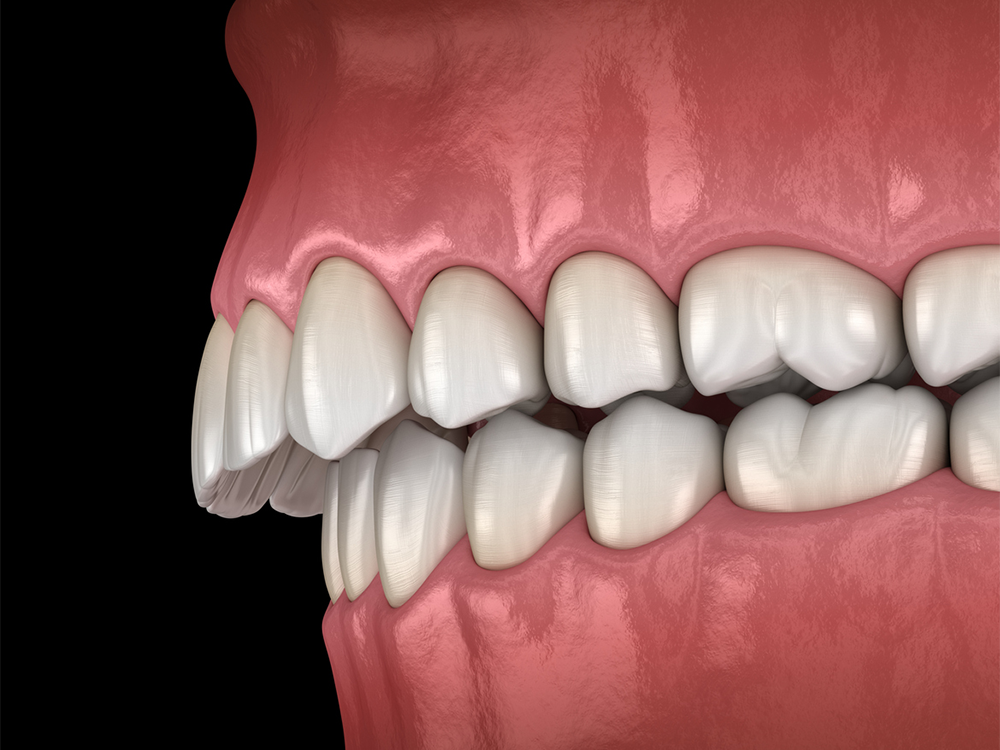Bite Correction
Dental malocclusions, including overbites, underbites, and crossbites can be effectively addressed through orthodontic treatments at Porters Neck Dental Aesthetics in Wilmington, NC.
Dental malocclusions, including overbites, underbites, and crossbites can be effectively addressed through orthodontic treatments at Porters Neck Dental Aesthetics in Wilmington, NC.

Overbite is frequent in both children and adults. The form and/or size of the jaw or teeth is the most typical cause of an overjet. There may be too much or too little space in the jaw region to fit one’s teeth. If an overjet is not addressed, teeth might cluster together and grow in crooked, causing more difficulties.
Overbites are a form of malocclusion, which is an irregular or rough contact between the upper and lower teeth. When the upper and lower teeth align, chewing and biting are easier. If they are misaligned it can lead to worn enamel, cracked and broken teeth, jaw pain, and a variety of other symptoms. If you believe your child is experiencing an overbite, call our office today to schedule an appointment!
An underbite can affect you at different stages in your life and can also be caused by multiple different factors. While underbites are best treated while the jaw is still developing, many adults live with this type of misaligned jaw and suffer from TMJ, headaches, chronic pain, and more. If you believe you or your child is experiencing underbite, call our office to schedule an appointment today!
A crossbite is common among young people and adults and can cause issues such as headaches, jaw pain, tooth decay, and other health and jaw development problems if it’s not corrected.
Crossbites are a form of malocclusion, which is an irregular or rough contact between the upper and lower teeth. When the upper and lower teeth align, chewing and biting are easier. If they are misaligned it can lead to worn enamel, cracked and broken teeth, jaw misalignment, and a variety of other symptoms. If you believe you or your child is experiencing crossbite, call our office today to schedule an appointment.
When baby teeth fall out prematurely, problems can arise if not maintained properly. In these cases, a pediatric orthodontist will place a device called a space maintainer in your child’s mouth to make sure that their adult teeth will grow properly. Space maintainers help “hold space” for permanent teeth. This prevents adult teeth from growing into an empty space instead of where they should be in the mouth–causing overcrowding and other dental problems as primary teeth fall out and adult teeth replace them.
Sometimes kids lose their baby teeth early due to trauma, congenital defects, accidents, or decay. There are different types of space maintainers, so your child’s orthodontist will recommend a space maintainer depending on your child’s situation.
At Porter’ Neck Dental Aesthetics, we can provide pediatric space maintainers for your child to ensure their permanent teeth grow in correctly.
Malocclusion refers to the misalignment of teeth in the upper and lower jaws, preventing them from fitting together properly when you bite. It’s also commonly known as a “bad bite.”
There are two categories of pediatric space maintainers. The first category is Fixed Space Maintainers. A fixed space maintainer is a semi-permanent tooth fixture that keeps enough space open for the adult teeth to grow in. Once the adult teeth come in, the maintainer is removed.
The second category of maintainers is removable space maintainers. These types of maintainers are a good option if your child’s tooth is just about ready to grow in. These devices are usually made of acrylic material and can be fitted with a fake tooth. The removable maintainers make it easier for your child to keep good oral hygiene habits. The downside to these maintainers is that they are not as effective at maintaining space as fixed devices.
There are several causes of malocclusion, including:
A mismatch between the jaw size and the size of the teeth
A thumb-sucking or tongue-thrusting habit
Premature loss or missing teeth
A deep bite is a malocclusion in which the upper front teeth excessively overlap the bottom front teeth when the back teeth are closed. This is also called an overbite or closed bite.
When the lower jaw is shorter than the upper jaw, the upper teeth are further “forward,” and the lower teeth keep growing until they hit the back of the upper teeth (the cingulate) or the roof of the mouth. Also, as the lower front teeth grow up under the upper front teeth, they often get pushed together, which can cause crowding and alignment problems.
Another thing that can cause a deep bite is the loss of a lower tooth. This makes the lower jaw look like it is shorter than usual. Lastly, the bite can get deeper if the muscles used to bite are very strong. This is common in people who clench or grind their teeth.
The causes of underbites can vary and may include:
Genetics: Did you know that underbites are most commonly inherited? Genetics help determine the shape and size of your teeth and jaw, meaning that overcrowded teeth or a misaligned jaw are likely inherited from other family members. If your underbite is due to genetics, prevention is not generally possible.
Injury: Serious facial injuries can cause lasting damage to the jaw. While it’s possible to surgically repair broken jaw bones, teeth may not always align post-surgery. This can potentially lead to an underbite.
If you have more questions about bite correction or want to schedule an appointment, please give us a call and we will be happy to discuss further.